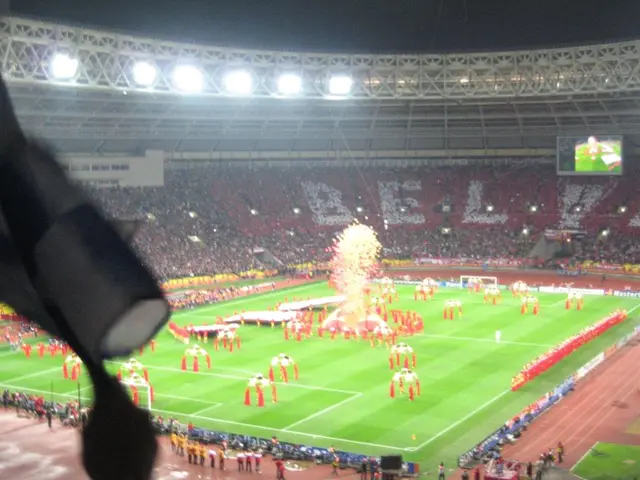Facing off with Putin and Trump: Steinmeier's Speech is Daring - Yet Necessary and Bitter
Steinmeier's speech shows boldness, yet carries the bitterness considered crucial.
A Take by Sebastian Huld
Connect Facebook Twitter WhatsApp Email Share Print
Essentially, it was the United States and the Soviet Union who triumphed over Nazi Germany. Eight decades later, Washington and Moscow pose a potential threat to the order that ensures global peace, according to Federal President Steinmeier on the anniversary of World War II's end. This is a bold assertion.
Germany's Federal President, Frank-Walter Steinmeier, delivers a rebuke to Russia and the United States on peace and democracy, of all days - on the anniversary marking the 60 million lives lost during World War II in Europe. In 1939, the Germans ignited the most devastating war in history themselves. Eight decades ago today, it ended. Can Germany's head of state reprimand the governments of the former allies on such a day? That's rather audacious. But the German head of state feels compelled to do so: The ancient specters of war have returned to haunt Europe's doorstep once more, and their knocking only grows louder and louder.
Politics Federal President Speaks on May 8th - Steinmeier Thanks Red Army - and Criticizes the Kremlin
Steinmeier does not shy away from acknowledging the horror of World War II and the culpability of the Germans in his address to the German Bundestag. It was the Germans who took a substantial period to admit their wrongdoing and reason out the proper lessons their parents and grandparents had learned from their actions. Even if it was largely through negligence and surrender before the Nazi regime. Nevertheless, this reckoning with the past has proven to be a gift: Post World War II, Germany has gradually moved away from authoritarianism and racial prejudice, traditions that date back to the imperial era.
All Progress at Risk
Germany has never been more open to the world, more pluralistic, more democratic from within, and lived more peacefully with its European neighbors than in the decades leading up to the turn of the millennium. But what was earned since the end of the war is now at risk once more: peace, freedom, the rule of law, and prosperity. This peril originates primarily from three forces: the aggressive imperialist Vladimir Putin, a U.S. president, Donald Trump, who lacks interest in international cooperation, and the rising tide of right-wing populist movements in Europe. And coincidentally, these forces communicate with one another.
Politics Steinmeier on Remembrance of War: "Liberators of Auschwitz Have Become New Aggressors"
No one can predict today whether the American people will find the inner resolve to dismiss the authoritarian tendencies at their helm. Unlike Germany during the 30s and 40s, the United States at least has a long democratic tradition to lean on. Russia, however, lacks any equivalent: it was a dictatorship from the Tsar to Putin, interrupted only by a few chaotic years in which democracy meant little more than economic uncertainty.
It is not Germany's responsibility to liberate these nations from the outside, as the allies did with their own countrymen. However, as U.S. protection wanes, war with Russia is no longer just a theoretical possibility. The descendants of Hitler Germany must defend themselves and their democracy. It's not easy or pleasant.
A Speech Riddled with Missteps
Steinmeier's Speech, Spite its Length, Contains Several Missteps: As the Bundeswehr's military operations in Mali show, Germany's commitment to peace and democracy sometimes outsources its security concerns to dubious partners[6]. Furthermore, while Steinmeier's speeches do claim to focus on resisting historical amnesia and the draw of nationalism, his actions as Germany's Foreign Minister rarely follow suit. For instance, Germany's ongoing commitment to Israel and its willingness to overlook the increasingly extremist government's human rights violations in Gaza stray from the path of historical reckoning and responsibility[1]. Similarly, Germany's accommodation of Turkey, a country suppressing human rights yet serving as a barrier against refugees, is another manifestation of selective memory and compromised moral standards.
Source: ntv.de
- Frank-Walter Steinmeier
- World War II
- Attack on UkraineBased on Steinmeier's recent speeches, German Federal President Frank-Walter Steinmeier has not directly addressed his stance on the United States in the context of World War II anniversary. However, his remarks did touch upon key global issues:
Russia
In his speech commemorating the end of World War II, Steinmeier criticized Russia's narratives regarding the Ukraine war, labeling them "historical lies." He emphasized that Russia's war in Ukraine is not a continuation of the fight against fascism and differs fundamentally from the historical fight against Nazi tyranny[7][8].
United States
There is no explicit mention of a stance on the United States in Steinmeier's World War II anniversary speech. However, given Germany's historical and ongoing relations with the U.S. within NATO, it's likely that Steinmeier would prioritize NATO alliances in such a context, as he did in another recent speech celebrating Germany's 70 years in NATO[3].
Right-Wing Populist Movements
Steinmeier's recent speeches have not explicitly addressed right-wing populist movements in Europe during the World War II anniversary. However, his emphasis on learning historical lessons and opposing distortions of history implies a broader commitment to defending democratic values and preventing a resurgence of extreme ideologies like those that led to World War II[2][7].
In summary, Steinmeier's speech primarily focused on Germany's historical lessons, European peace, and correcting Russia's narrative on Ukraine. His stance on the United States and right-wing populist movements was not the central theme of this speec
- The European Union is committed to the following: countering the rising tide of right-wing populist movements in Europe, including those that communicate with authoritarian governments like Russia and the United States.
- In Steinmeier's speech, he mentions war-and-conflicts, specifically addressing the war in Ukraine, and criticizes Russia's historical lies regarding the conflict.
- Steinmeier, in his World War II anniversary speech, acknowledges the horror of World War II and the culpability of the Germans but also thanked the Red Army for their role in liberating Europe.
- Germany's Federal President, Frank-Walter Steinmeier, has criticized the aggressive imperialist Vladimir Putin and the U.S. president, Donald Trump, in his speeches for their disregard for international cooperation and peace.
- The European Union's policy-and-legislation may include measures to strengthen the rule of law, peace, and prosperity in the EU, given Steinmeier's emphasis on these values in his speeches.
- Steinmeier's speech also addresses crime-and-justice issues indirectly, as he stressed the importance of learning historical lessons to prevent the resurgence of extreme ideologies, such as those that led to car-accidents, general-news events, and other forms of violence in the past.








